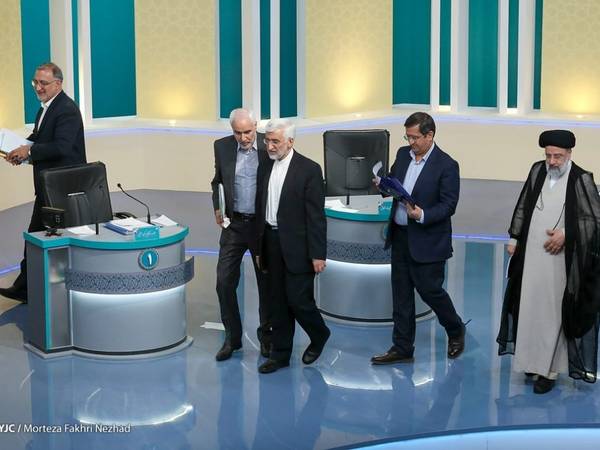A wave of speculation surrounds who will be allowed or chosen to succeed Iran’s deceased president, amid widespread public apathy evidenced by the historic low turnout in recent parliamentary elections.
Among the names frequently mentioned on social media as potential successors are the caretaker of the presidency, Mohammad Mokhber; outgoing Parliament Speaker Mohammad-Bagher Ghalibaf; former Revolutionary Guards (IRGC) general Saeed Mohammad; ultra-hardliner Mayor of Tehran Alireza Zakani; Chief Justice Gholam-Hossein Mohseni-Ejei; Secretary of the Supreme Security Council Ali Shamkhani; and the shadowy former nuclear negotiator Saeed Jalili. All of these figures belong to the hardliner camp.
Other figures being discussed as possible candidates include moderate-conservative former Speaker Ali Larijani, former Foreign Minister Mohammad-Javad Zarif, ‘reformist’ former Vice President Eshaq Jahangiri, former President Mahmoud Ahmadinejad who separated his way from other hardliners several years ago, and even Hassan Khomeini, grandson of Ruhollah Khomeini who some reformists favor.
“It’s elections again, and ‘wishes’ are being floated in the garb of ‘analysis’ and ‘news’ …Some people say that Zarif, Hassan Khomeini, or people like Jahangiri, Larijani, etc. will be approved to run, and others prompt the same view about Ahmadinejad,” chief editor of the moderate Asr-e Iran news website, Mostafa Faghihi, tweeted Tuesday.
“What difference have they observed in the behavior of the ‘political establishment’ [to make such assumptions] …?” Faghihi asked and argued that the upcoming elections would only be held “within the ranks of revolutionaries.”
This, Faghihi contends, means the elections will be limited to candidates within the hardliner camp, which he believes is a spectrum of different factions as suggested by the escalating infighting among ultra-hardliners and frequent ‘revelations’ and serious allegations of corruption and fraud former allies are constantly bringing against each other.
“What’s the point in involving the rabble rousing reformist and moderate camps with their opposition-like attitudes?” Faghihi asked sarcastically.
The moderate Rouydad 24 news website suggested Tuesday that four different ‘scenarios’ for the upcoming elections could be envisaged, namely a repetition of the scenario implemented in the engineered presidential elections of 2021, in which Raisi won. This time, acting president Mohammad Mokhber can be endorsed by top hardliners or indirectly by the Supreme Leader. Another option for Khamenei is to allow competition within the closed ranks of hardliners, or allowing other political groups to be represented, to encourage public interest and high turnout.
The most likely scenario, Rouydad 24 contended, is competition within the ranks of hardliners while comparatively freer elections in which other political groups are represented, similar to the 2013 elections in which centrist Rouhani won, is the least likely to happen.
One of the biggest challenges facing the Islamic Republic and its supreme leader is finding a way to reengage an electorate that has been deeply disillusioned by recent elections, while simultaneously ensuring hardliners retain control over the now largely ceremonial presidency.
According to official figures, in the first round of the recent parliamentary elections 40.6 percent of eligible voters turned out at the ballot. In the capital Tehran, 24 percent voted. This was the lowest in any elections in the history of the Islamic Republic.
Turnout in the run-off elections held earlier this month was even lower. Only seven percent of the eligible voters in Tehran went to the polls.
To be able to run, candidates in presidential and parliamentary elections as well as the Assembly of Experts which is responsible for appointing Supreme Leader Ali Khamenei’s successor, must be approved by the constitutional election watchdog, the Guardian Council.
The Council has a long record of disqualifying nominees in all elections, particularly in the past two decades. Disqualified candidates included several former top officials which the Council itself had endorsed before including former presidents Akbar Hashemi-Rafsanjani, Mahmoud Ahmadinejad and Hassan Rouhani as well as former Parliament Speaker Ali Larijani and a host of lesser officials.
Khamenei appoints the six principal members of the Council and, in addition to issuing behind-the-scenes instructions, has the power to overturn their decisions with so-called "state edicts."
Khamenei reinstated two reformist candidates disqualified by the Council, Mohsen Mehralizadeh and Mostafa Moeen, with such edicts in the controversial presidential elections of 2005 which brought hardliner Mahmoud Ahmadinejad to power.
Khamenei’s move was largely seen at the time as a measure to entice reluctant supporters of reforms to vote to increase the turnout as a high turnout would be proof of “legitimacy of the Islamic Republic”.
